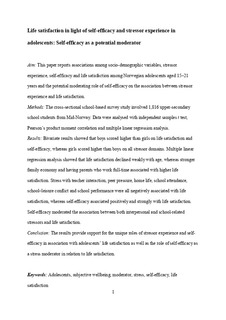Life satisfaction in association with self-efficacy and stressor experience in adolescents – self-efficacy as a potential moderator
Moksnes, Unni Karin; Eilertsen, Mary-Elizabeth B; Ringdal, Regine; Bjørnsen, Hanne Nissen; Rannestad, Toril
Journal article, Peer reviewed
Accepted version

Åpne
Permanent lenke
http://hdl.handle.net/11250/2608236Utgivelsesdato
2018Metadata
Vis full innførselSamlinger
Sammendrag
Aim
This paper reports associations among socio‐demographic variables, stressor experience, self‐efficacy and life satisfaction among Norwegian adolescents aged 15–21 years and the potential moderating role of self‐efficacy on the association between stressor experience and life satisfaction.
Methods
The cross‐sectional school‐based survey study involved 1816 upper‐secondary school students from Mid‐Norway. Data were analysed with independent samples t test, Pearson's product moment correlation and multiple linear regression analysis.
Results
Bivariate results showed that boys scored higher than girls on life satisfaction and self‐efficacy, whereas girls scored higher than boys on all stressor domains. Multiple linear regression analysis showed that life satisfaction declined weakly with age, whereas stronger family economy and having parents who work full‐time associated with higher life satisfaction. Stress with teacher interaction, peer pressure, home life, school attendance, school–leisure conflict and school performance were all negatively associated with life satisfaction, whereas self‐efficacy associated positively and strongly with life satisfaction. Self‐efficacy moderated the association between both interpersonal and school‐related stressors and life satisfaction.
Conclusion
The results provide support for the unique role of stressor experience and self‐efficacy in association with adolescents' life satisfaction as well as self‐efficacy as a stress moderator in relation to life satisfaction.